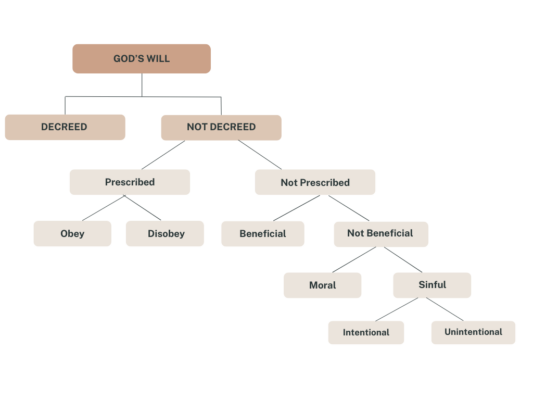Ekstra kazanç için oyuncular Bettilt seçeneklerini değerlendiriyor.
Canlı destek hattı ile kullanıcılarına 7/24 hizmet veren Bettilt hızlı çözümler üretir.
Türkiye’deki bahisçiler için en güvenilir adreslerden biri lisanslı bahis siteleri olmaya devam ediyor.

In the Garden of Gethsemane, hours before His death, in His most agonizing moment, Jesus fell to the ground and three times prayed, “My Father, if it is possible, may this cup [of suffering] be taken from me. Yet not as I will, but as you will” (Matthew 26:39b).
Bringing our free will into alignment with God’s will is the elephant in the room. If we could just figure that out, then everything would fall into place, right? That would give us clarity, direction, and peace. But how?
Today I’m giving you seven practical tools to help you discern God’s will—#27 on my alphabetical list of 70 things every man needs to know. But first, let’s take some of the mystery out of the idea of finding God’s will.
The chart below shows that God’s will is made up of things either decreed or not decreed. His decrees, such as to create the Earth or knit you together in your mother’s womb, are the sovereign decisions of God and cannot be altered. Neither your will nor mine is a factor.
What God has not decreed, He either prescribes or does not prescribe. For example, God prescribes to love your neighbor and not commit adultery, but God does not prescribe which job to take or home to purchase. Both the things He prescribes and the things He doesn’t require the exercise of free will on our part—obedience in the case of what’s prescribed and making wise choices in the case of what’s not prescribed.
Going one step further, choices that God does not prescribe may be beneficial or not beneficial. In Paul’s letter to the Corinthians, he wrote, “‘I have the right to do anything,’ you say—but not everything is beneficial” (1 Corinthians 6:12a).
Beyond that, if something is not beneficial, choices may be moral or sinful. And sinful choices may be intentional or unintentional. Here’s an example of unintentional sin: a man shares a prayer request at his Bible study for a friend’s marriage troubles. He may think he’s being helpful, but because of spiritual immaturity he betrayed his friend’s confidence.
Here’s how this all fits together:

Discerning God’s Will: 7 Means of Guidance
God wants to help you understand His will. James 1:5 tells us: “If any of you lacks wisdom, you should ask God, who gives generously to all without finding fault, and it will be given to you.” He’s provided these seven means of clarity and discernment for you:
1. The Bible. The single most important question to ask is, “Has God already spoken on this matter?” The Bible is chock full of both commands (which are duty) and principles (which are wise). We don’t have to wonder if not reporting $1,800 of incidental income to the IRS is God’s will. We know it is. As the Bible says, “Do not go beyond what is written” (1 Corinthians 4:6b). Obedience is the trademark of a biblical Christian.
2. Prayer. In Luke 11:8, Jesus shares a story about a man who persistently asks his friend for bread. The friend eventually gives in—not because of their friendship but rather because of the man’s “shameless audacity.” Jesus uses this story to encourage us to pray with boldness and persistence. The promise here is that God will give you “whatever you ask for when it aligns with His will, but never less than as much as you need” (from Ask Pat).
3. The Holy Spirit. God lives in us in the Person of the Holy Spirit. He is our counselor, convicter, comforter, converter, and encourager. Consciously depend upon Him, and He will both guide you and intercede for you. “The Spirit intercedes for the saints in accordance with God’s will” (Romans 8:27b). The Holy Spirit clothes us with power from on high. And the Holy Spirit will never lead in contradiction to His written Word.
4. Conscience. In seeking God’s will, we must live by the pledge of a good conscience toward God and other people. “Dear friends, if our hearts do not condemn us, we have confidence before God” (1 John 3:21). Keep in mind that while a guilty conscience provides clear evidence you are not in God’s will, a clear conscience may not guarantee you have correctly discerned God’s will. Conscience is more effective as a red light than a green light. To go against conscience is neither wise nor safe.
5. Circumstances. Some people are born short, some tall. Some black, some white. Some in America, some in Argentina. Some to poor parents, some to rich. God’s will is often revealed clearly by the circumstances in which we live. “He determines the times set for them and the exact places where they should live” (Acts 17:26b). If you want to purchase a house that will require a $400,000 mortgage and you can only qualify for $300,000, then circumstances have told you God’s will.
6. Counsel. “Plans fail for lack of counsel, but with many advisers they succeed” (Proverbs 15:22). At times, we need nothing more than a good listener to help us crystallize our thoughts into coherent words. Other times, we need the advice of a trusted friend or expert. And still other times, we need a good kick in the pants.
7. Fasting. Fasting is a lost spiritual discipline in this age. Fasting slows down the physical functions so that the mind can be more in tune with Christ. A good passage to encourage fasting is Matthew 6:16-18, where Jesus talks about fasting as a common practice and instructs us to do it with sincerity and humility. It reminds us that fasting is a personal and spiritual discipline meant to deepen our relationship with God.
Trust in these biblical means for gaining clarity on the will of God. Do them only occasionally and it will amount to nothing more than priming a rusty pump. Do them regularly and the will of God will gush forth like deep well springs.
For reflection and discussion: